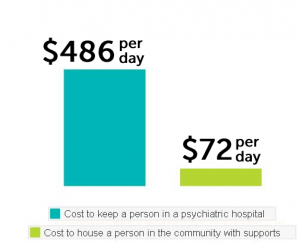Housing is a basic human right and requirement for good health. According to the United Nations’ Universal Declaration of Human Rights the right to housing is protected under international law, and Canada has endorsed such rights guaranteeing “an adequate standard of living… including adequate food, clothing and housing.” Likewise, the Ottawa Charter for Health Promotion identifies shelter as a basic prerequisite for health.
The relationship between housing and mental health
Adequate, suitable and affordable housing contributes to our physical and mental well-being. It leads to increased personal safety and helps decrease stress, leading to improved sleep and diet. All of these factors result in better mental health outcomes. When housing is inadequate or unavailable, personal as well as community well- being can suffer. People with lived experience of mental health and addictions conditions (PWLE) are disproportionately affected by homelessness. While many factors can lead to homelessness, mental health plays a significant role as an estimated 25 to 50 per cent of homeless people live with a mental health condition. The consequences of homelessness tend to be more severe when coupled with a mental health condition. PWLE remain homeless for longer periods of time and have less contact with family and friends. They encounter more barriers to employment and tend to be in poorer health than other homeless people.
 Homelessness is a significant health care issue and continues to produce enormous costs to our economy. According to the Mental Health Commission of Canada, an estimated 150,000 to 300,000 people across Canada are homeless, which results in $1.4 billion each year in costs to the health care, justice and social services systems. Housing designed for people with mental health conditions can contribute to significant cost savings for the health system. It costs $486 a day ($177,390 per year) to keep a person in a psychiatric hospital, compared to $72 per day ($26,280 per year) to house a person in the community with supports.
Homelessness is a significant health care issue and continues to produce enormous costs to our economy. According to the Mental Health Commission of Canada, an estimated 150,000 to 300,000 people across Canada are homeless, which results in $1.4 billion each year in costs to the health care, justice and social services systems. Housing designed for people with mental health conditions can contribute to significant cost savings for the health system. It costs $486 a day ($177,390 per year) to keep a person in a psychiatric hospital, compared to $72 per day ($26,280 per year) to house a person in the community with supports.
Many PWLE live independently, however, for those with more serious mental health conditions, there are a variety of supports available to them. Housing with supports gives an individual access to a range of housing options: supportive housing, supported housing, and rent supplements. Supportive housing provides assistance by staffing housing units, usually with 24-hour supports. Other individuals may live in the larger community and have supports, such as homecare and counseling when they need it. This is referred to as supported housing.
For more information on the importance of housing and mental health, read CMHA Ontario’s report Housing First: The Path to Recovery.